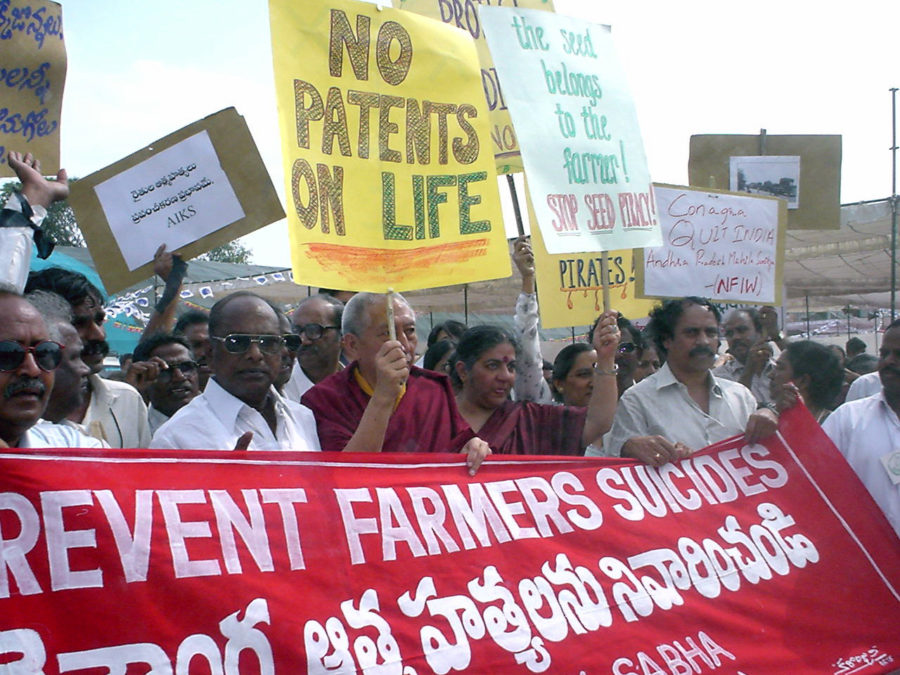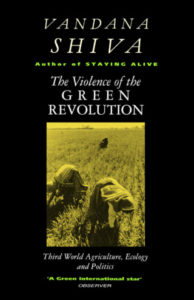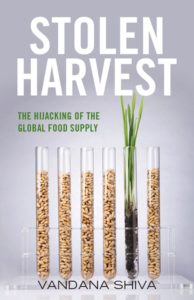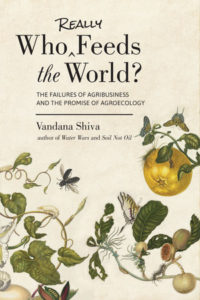
The Green Revolution left farmers discontented and indebted as the result of degraded soil, and pest-ridden crops, which caused slavery and disillusionment as well as tension in the State of Punjab between the farming community and a newly centralized state taking charge of agricultural policy as well as agricultural commodities’ prices, finance and credit. Before the Green Revolution, Punjab was the land of five rivers, prosperous, with hard-working farmers. By 1984 Punjab farmers were protesting against this slavery. It became a land of violence and war.
In 1984 Punjab farmers were protesting against the #GreenRevolution model saying if you cannot choose what you grow or how you will grow it , these are conditions of slavery . They have already paid a very high price with debt , suicides & a #CancerTrain https://t.co/FNOjapGo4e https://t.co/Dpu9fvOyLC
— Dr. Vandana Shiva (@drvandanashiva) December 9, 2020
The deregulation of commerce has been pushed by the corporate world since the onset of GATT and WTO where rules were written by corporations to enlarge their freedom to commodify and privatise land, water, seed, food, information, data, and knowledge.
By enclosing the commons, the freedom of people, their cultures and democracies is destroyed. It is about an end to real economies where independent producers exchange and sell goods at fair and just prices. Along the same lines, the World Bank’s structural adjustments imposed in 1991 dismantled India’s food security system. By removing the laws regulating markets, prices and stock-holding, it destroyed farmers’ livelihoods, people’s right to food and food as a public good, in order to create a “free market“ in corporate commodities.
Corporations have been trying to impose #freetrade #deregulation of #Agriculture since 1990s . Freedom for corporations translates into unfreedom for farmers & consumers . Farmers income collapse , consumer prices increase #PolarisationofPrices=superprofits for corporations pic.twitter.com/TTH9d8SpdZ
— Dr. Vandana Shiva (@drvandanashiva) December 7, 2020
Half a million farmers participated in a historic Seed Freedom – Bija Satyagraha rally In 1993 at Bangalore’s Cuban’s Park. This was the first international protest against WTO.
The Indian farmers’ protests we are witnessing today are a continuation of these earlier protests and are against the World Bank conditionalities being made law.
Millions of farmers are today protesting across the streets of Delhi to ask the government to cancel the so called “Farm Bills”, the new laws passed to deregulate the market. A step taken which ignores the trade unions that represent some 650 million workers of the sector, and which, clearly, is in the interest of the big agribusiness corporations.
As the strikes and public protests continue, Vandana Shiva, president of Navdanya International, underlines that the so called “Farm Bills” are in reality`Food System Bills’. They indeed will determine food production, farmers’ incomes, food prices, and will have impacts on soils, biodiversity and natural resources endangering 70 years of a regulatory system to protect small farms, small farmer livelihoods and food sovereignty of the country.
The government initiative does not come as a surprise. On the contrary, the attempt to hand over the Indian agriculture sector to international corporations is as old as Navdanya, created over 30 years ago by Vandana Shiva to stop such corporate takeover. As Navdanya’s founder attests: “The World Bank and Corporations have been trying to introduce these laws to dismantle India’s food Sovereignty since the 1991 Structural Adjustment. For 30 years we have stopped these laws. If they are not repealed, they will destroy what is still the biggest food system of the world, real farming by real farmers, created and sustained by small farmers over thousands of years”.
These laws embody the push towards corporate globalisation in the name of “free trade” and competitiveness, perpetuating the neoliberal illusion that „the market regulates itself,“ while instead the consequences for local economies and small farmers are devastating. This so called “freedom“ is only for corporations and their masked owners, a term misused to destroy the Earth’s ecological fabric — the fabric of people’s economies and societies.
The farmers’ struggle in India is for the common future of humanity: Will we have a future of fake food without farmers, without diversity, without food democracy? or a future of healthy food for all grown by real farmers in abundant biodivesty, growing real food, taking care of our health and the health of the planet?
Background – Navdanya
When in 1991 the Dunkel Draft Text of the WTO agreement was leaked, and the patenting of seed leading to monopolies became a reality, Navdanya organised awareness campaigns and rallies to alert farmers across the country. It spearheaded the movement to protect and create awareness amongst farmers and also to sensitize policy makers and politicians on farmers’ rights to seed to prevent the discussion being determined by the corporate sector and interests driven by profit motives.
The organization has been instrumental in conserving biodiversity through the set up of over 120 community centered, decentralised indigenous seed banks across India, which are making farmers free of dependence on costly, unreliable, and nutritionally empty seeds and helping them move from vulnerability to resilience in the context of climate change. It’s work with small farmers has shown that small biodiverse farms based on agro-ecology and nutrition-sensitive agriculture can provide full and adequate nutrition to twice India’s population.
In 2006, with the growing farmers’ suicides in Maharashtra, Andhra Pradesh and Karnataka, known as the suicide belt of the country, Navdanya, under its Seeds of Hope program, mobilized the movement to protect farmer’s rights to seed saving and seed sharing, providing guidance and assistance to the farmers, also distributing the indigenous variety of seeds to the farmers encouraging them to shift to organic and sustainable agriculture, as in 2015 when cotton farmers started loosing their harvest to the whitefly pest attacks.
Since the mid-2000s Big Agribusiness has been pushing for the introduction of new GMOs in India. Bt Brinjal was approved for commercialization in India in 2009. Navdanya joined the movement opposing the approval, and – after much public outcry and rounds of debates, the Indian government passed a moratorium on Bt Brinjal in February 2010, introducing a ban that is in place until today. Amidst the relentless push by biotech lobbies to impose GM Mustard in India, Navdanya along with multiple civil society organizations are once again since 2017 on the frontline to resist the GM Mustard. This is not the first time that Indian mustard is under threat. In 1998 India’s indigenous edible oils made from mustard, coconut, sesame, linseed and groundnut processed in artisanal cold-press mills were banned, using “food safety” as an excuse. The restrictions on import of soya oil were simultaneously removed. The result was that one million oil mills in villages were closed. And millions of tons of artificially cheap GMO soya oil continue to be dumped on India. During that time, women from the streets of Delhi joined forces with Navdanya and the National Women’s Alliance for Food Sovereignty (Mahila Anna Swaraj) to start the Sarson Satyagraha and succeeded in bringing back pure mustard oil.
Navdanya has been supporting farmers’ seed and food sovereignty and local food economies by exposing the imports of foreign commodities, such as soy to replace indigenous oil seeds and pulses, that kept increasing through the policy of dumping and manipulation. Along the same lines the organization has been defending artisans’ rights to produce oil seed, which were served a notice in 2015 under the corporate driven regulations of the new FSSAI Act.
The roots of the contemporary Agrarian Crisis lie in 50 years of the chemical intensive, capital intensive, monoculture based “Green Revolution”, and 20 years of corporate globalisation, which has transformed Indian Agriculture into a market for costly seed and chemical inputs and a supplier of cheap commodities. In the course of 30 years, the work flowing from Navdanya Biodiversity Conservation Farm and Earth University has helped more than 200,000 hectares of land to switch to organic and established the largest direct marketing, fair trade organic network in the country.
Navdanya International
 The Violence of the Green Revolution |
 Stolen Harvest |
 Making Peace with the Earth |
 Who Really Feeds the World |
TWEETS
India ‘s culture & history has been shaped by farmers , the keepers of the land , who live in accordance with the laws of the land , the laws of the earth & have resisted the rule of corporate greed enshrined in laws of the market #UttamKheti farming is the highest vocation . https://t.co/vLcn9zrJuO
— Dr. Vandana Shiva (@drvandanashiva) December 18, 2020
#SmallFarms are not a problem but the answer to multiple emergencies of our times – hunger, lack of livelihoods , disease , climate change , extinction. Small farmers provide 80% of the food @FAO They produce more nutrition per acre Future depends on small farms @timesofindia https://t.co/eZl86pUuqj
— Dr. Vandana Shiva (@drvandanashiva) December 13, 2020
While imposing #GreenRevolution on #Punjab World Bank stole India’s rich #RiceHeritage from our national collection in Orissa & created #IRRI,removed Dr Richaria who objected https://t.co/M1pzb5ZTKJhttps://t.co/YqLvk85J0v. #IRRI now controlled by #Gates pushing #GMO #GoldenRice https://t.co/uOiL21kACV
— Dr. Vandana Shiva (@drvandanashiva) December 12, 2020
#Punjab farmers never chose to grow chemical intensive , water intensive,capital intensive #dwarfvarieties of rice. It was forced on them by #WorldBank & US as the #GreenRevolution Dwarf varieties deprived soil of organic matter,depleted water, spread #pesticides #Cancer #debt
— Dr. Vandana Shiva (@drvandanashiva) December 12, 2020
Farmers have already paid a very high price for profits of #PoisonCartel #BigAg through imposition of #IndustrialAg as #GreenRevolution & #corporateglobalisation as #deregulation Earth needs protection thru #environmentallaws. Farmers need regulation of prices & for their safety https://t.co/bYgwUaOBbQ
— Dr. Vandana Shiva (@drvandanashiva) December 12, 2020
#GMO #BtCotton was introduced in India & Burkina Faso as a miracle technology with the false promise that it would end pesticide use . #BtCotton has failed, increased use of presticides, increased #FarmersDebt , triggered #FarmersSuicides #DesiSeeds https://t.co/ADP434dcq2 https://t.co/rWTMlXJp8K
— Dr. Vandana Shiva (@drvandanashiva) December 12, 2020
#AnnamBrahman Our #Annadatas grow real food that brings us health & nourishment . Corporations first made chemicals & imposes #GreenRevolution Then they braught #GMOs to own seeds through patents . Now they want patented food engineered in the lab & want to get rid of farmers . https://t.co/vaSAubGLJR
— Dr. Vandana Shiva (@drvandanashiva) December 10, 2020
India passed the #EssentialCommoditiesAct in 1955 after we gained freedom to never again allow hoarding ,speculation & profiteering to lead to famine.This law is famine prevention law ,#RightToFood law. Since food is life, it is #RightToLife law under Art 21 of our Constitution. https://t.co/Vmmf7VToeF
— Dr. Vandana Shiva (@drvandanashiva) December 8, 2020
Whether it is organising #langars to feed millions or organising passage of ambulances during #BharatBandh Indian farmers are demonstrating to the world the power of self organisation #Swaraj #livingdemocracy #participatorydemocracy based on unity, solidarity,care & compassion https://t.co/TdAsEey691
— Dr. Vandana Shiva (@drvandanashiva) December 8, 2020
In 1942 , extractivist greed of the #BritishEmpire led to the #GreatBengalFamine which killed 2 million . Women peasants started the #TebhagaMovement #JanDebuDhanDebuNa “We will give our lives , not our rice”. #OperationBarga of 1978 restored Land rights to cultivators in Bengal https://t.co/X85lgAxHY0
— Dr. Vandana Shiva (@drvandanashiva) December 8, 2020
#smallfarmers of North West India stayed independent & proud owner cultivators of land by resisting British Colonial system of #Zamindari #Landlordism & #Lagaan #RentCollection which devastated Eastern India with debt , dispossession & famine. #FarmersStruggle is #decolonisation https://t.co/Qzyd83B284
— Dr. Vandana Shiva (@drvandanashiva) December 8, 2020
Hard working farmers are the #soil & #soul of India . They have kept the soil alive with their love & care. Industrialisation & corporatisation of agriculture is a recipe of desertification of #DhartiMa They keep the soul of India alive by giving us the gift of food & health https://t.co/waBKN6szEt
— Dr. Vandana Shiva (@drvandanashiva) December 8, 2020
#smallfarmers feed India #smallfarmers feed the world Corporations create hunger, disease, climate change & are driving species to extinction.They want a #digitalfarming without farmers & food made in labs. #standwithfarmars to protect your health & the health of the planet
— Dr. Vandana Shiva (@drvandanashiva) December 7, 2020
Farmers are the keepers of the soil & soul of India #StandwithFarmers if you care for the earth , for our food sovereignty which is our national soveregnty , for the dignity , freedom & livelihoods of our #annadatas Food in the hands of corporations is end of our #foodfreedom https://t.co/Vu7e8OWnrk
— Dr. Vandana Shiva (@drvandanashiva) December 7, 2020
India is a civilisation based on food . Growing & giving of food in abundance is highest #Dharma . #AnnamBahuKurvita . Our indigenous Ag ensures #AnnadataSukhiBhava The #BigTech #BigAg dystopia of farming without farmers means intensification of war against the earth & farmers
— Dr. Vandana Shiva (@drvandanashiva) December 7, 2020
#CorporateControl over agriculture can only be achieved through #deregulation After Import Restrictions were removed in 1997 farmers prices started to collapse consumer prices started to increase. MSP protects farmers Essential commodities act protects consumers #FoodSovereignty pic.twitter.com/msT2qxbI8x
— Dr. Vandana Shiva (@drvandanashiva) December 7, 2020
India is #FoodSovereign the largest food economy with 60% of our people our #Annadatas feeding 1.3 billion. Kissinger said “Food is a Weapon”. 1991 reforms attempt to destroy our FoodSystems , farmers livelihoods #RightToFood . Farmers struggle #Atmanirbharta vs #FoodImperialism https://t.co/x2I2U8kFNG
— Dr. Vandana Shiva (@drvandanashiva) December 6, 2020
Small farmers are the foundation of India as an agrarian civilisation based on #CareForTheEarth. Every 4 th farmer of the world is Indian .In 1857 peasants ended corporate rule of #EastIndiaCompany Today they rise again to protect the soul of India & humanity #OurBreadOurFreedom
— Dr. Vandana Shiva (@drvandanashiva) December 4, 2020
It was the #FarmersProtests & #BhopalGasTragedy in 1984 that led me on the journey to understand the roots of Violence of #IndustrialAgriculture & walk the path of nonviolent #biodiverse #EcologicalAg . In solidarity with farmers & Bhopal victims #NoMoreBhopals #StandWithFarmers https://t.co/WmakGuls9S
— Dr. Vandana Shiva (@drvandanashiva) December 4, 2020
In 1991 when Dunkel Draft of GATT was leaked Indian farmers mobilised in hundreds of thousands to resist the corporate take over of our seeds & freedoms ,as they are resisting now . #Corporatefreedom vs #Farmersfreedom https://t.co/9BYjwtsJHHhttps://t.co/vRSUOnCl9e https://t.co/tvFvM0SSTk
— Dr. Vandana Shiva (@drvandanashiva) December 2, 2020
Farmers have been fighting to defend their food soveregnty & the food soveregnty of India since 1991 when World Bank imposed Structural Adjustment & GATT / WTO opened the doors for Corporate Hijack of our Food & Agriculture thru #freetrade rules for global corporate dictatorship
— Dr. Vandana Shiva (@drvandanashiva) December 1, 2020
#FoodSoveregnty = #NationalSecurity #Farmers are the foundation of India’s Food #SelfReliance #AtmaNirbharta
— Dr. Vandana Shiva (@drvandanashiva) November 30, 2020
#Biodiversity & small farmer centred systems protect the earth , farmers livelihoods & health for all. Indian farmers have taught the world how to protect the planet while feeding 1.3 billion. Our #FoodSovereignty & #health depends on our #Annadatas https://t.co/1zUgnrJyID. https://t.co/c4h3H3q1Cy
— Dr. Vandana Shiva (@drvandanashiva) November 28, 2020
Why are our #Annadatas our farmers on the streets ? How has globalisation & corporate #freetrade created the agrarian crisis & trapped farmers in debt & suicides ? #StolenHarvest a film based on my book on the roots of the multiple crises of food& farming https://t.co/bJ2Psndq9T
— Dr. Vandana Shiva (@drvandanashiva) November 28, 2020
